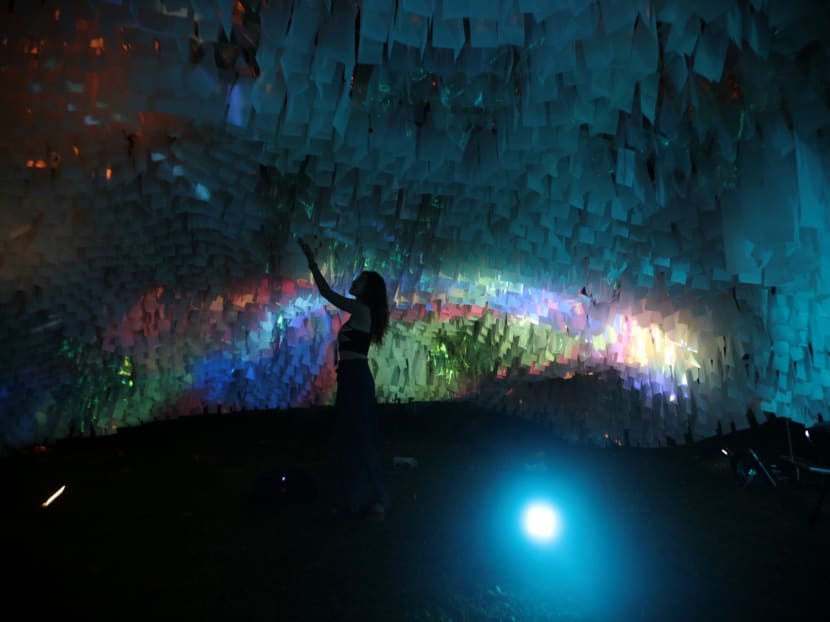Firm behind Sunday Times survey clarifies that findings ‘don’t mean S’poreans don’t value artists’
SINGAPORE — Following a public outcry especially among the arts community, the firm commissioned by The Straits Times to carry out a survey has sought to clarify that the findings do not mean that Singaporeans do not value artists or human resource professionals.

A Singapore Night Festival 2018 night light installation 'Pulse' by Galina Mihaleva, Hedren Sum, Pat Pataranutaporn, Kathrin Albers and Audrey Ng at the Armenian Church.
SINGAPORE — Following a public outcry especially among the arts community, the firm commissioned by The Straits Times to carry out a survey has sought to clarify that the findings do not mean that Singaporeans do not value artists or human resource professionals.
They also do not mean that Singaporeans do not see such jobs as essential outside of the context of the Covid-19 circuit breaker.
Based on the responses of 1,000 people, the survey published on June 14 in The Sunday Times — the Sunday edition of The Straits Times — had listed the “top five non-essential jobs”: Artists, telemarketers, social media manager/public relations specialist, business consultants and human resource manager.
In a lengthy statement put up on its website on Monday, consumer research firm Milieu Insight noted the “great deal of discussion about the results” as well as “some critical response”, and explained the methodology behind the poll.
The survey was conducted from June 5 to 8, with responses collated from respondents aged 16 and above with a “nationally representative sampling across age, gender and income groups”.
Among other things, Milieu noted that the respondents answered the survey questions “according to the definition of ‘essential workers’ that was shown at the beginning of the survey”.
The definition stated that these are workers “engaged in work deemed necessary to meet basic needs of human survival and well-being, such as food, health, safety and cleaning”.
Alluding to the survey findings on essential and non-essential jobs identified by the respondents, the firm said: “Some could argue that art is a basic human need, and many of us at Milieu would agree. But in the context of a post-Covid-19 world, and based on the definition of essential workers provided, these are the jobs, based on a shortlist of professions, that Singaporean adults deem essential (versus) non-essential.”
Milieu said the survey comprised 19 questions in total. Among the questions, respondents were then shown a list of 20 jobs and asked to select the ones they deemed essential and non-essential.
“We’re confident that, if asked, most Singaporeans would agree that artists and their work, be it a musician, painter, dancer or filmmaker, are absolutely essential to the enjoyability of our lives and our own mental health and well-being,” the firm added.
It acknowledged that there are questions that the survey does not answer, as well as “some caveats for how we interpret the results of the questions that were asked”.
The Sunday Times, which published three articles on the survey, said in its reports that the poll hoped to “capture how people’s perceptions of essential workers have changed, if at all, against the backdrop of Covid-19, and whether they would be willing to pay these workers more”.
However, the articles triggered an outcry on social media, with some — including those working in jobs deemed by the survey to be “non-essential” — criticising the framing of the survey and how the findings could demean some occupations and discourage people from joining them.
TODAY reached out to The Straits Times on the matter but it did not respond.
ARTS COMMUNITY WEIGHS IN
Speaking to TODAY, Nominated Member of Parliament Terence Ho, who is the executive director of the Singapore Chinese Orchestra, reiterated that artists “stand out in their own way” and “cannot be compared to blue collar workers”.
“If they wanted to shine a light on the blue collar workers like hawkers or cleaners, there are many other ways to do it. When you put artists together with them it doesn’t make sense. The products and the outcomes of an artists’ work compared to the other jobs are very different. How can you compare?” he said.
He added that the survey could have compared different industries instead of jobs, in order to point out which are the most essential industries during this time.
Mr Tan Qing Lun, 32, a freelance musician said that the survey could have highlighted the most essential jobs but there was “no need” to mention what people thought to be non-essential.
“It didn’t add to what they were trying to find out, which is if Singaporeans would be willing to pay these workers more. It made us (artists) feel that we don’t have importance in a situation like this which is not true,” said Mr Tan, who added that during the circuit breaker, he still continued with digital performances for his fans, friends and family to watch.
The multi-flute soloist also pointed out how the arts kept many people going during the circuit breaker period when they had to stay home.
“During their breaks and to get their minds off work for awhile, many turn to watching shows or listening to music, some even tune in to my performances. I have gotten feedback saying that by watching me perform, it makes their time at home more fruitful or helps time to pass faster,” he said.
Mr Adeeb Fazah, the artistic director of theatre company The Second Breakfast Company, agreed that the survey should not have highlighted the non-essential jobs, so as “not to anger or shame specific roles”.
Mr Adeeb said that he, along with other artists who saw pictures of the infographics from the survey circulating on social media, was “angry” because it was unclear what the data was meant to signify and what the intention of the survey was.
“But I was not surprised at that particular finding because, working in theatre, I am constantly advocating and fighting for more space… for better pay and more opportunities simply because the arts, in many people's minds, are not as important to society as other things,” he said.











